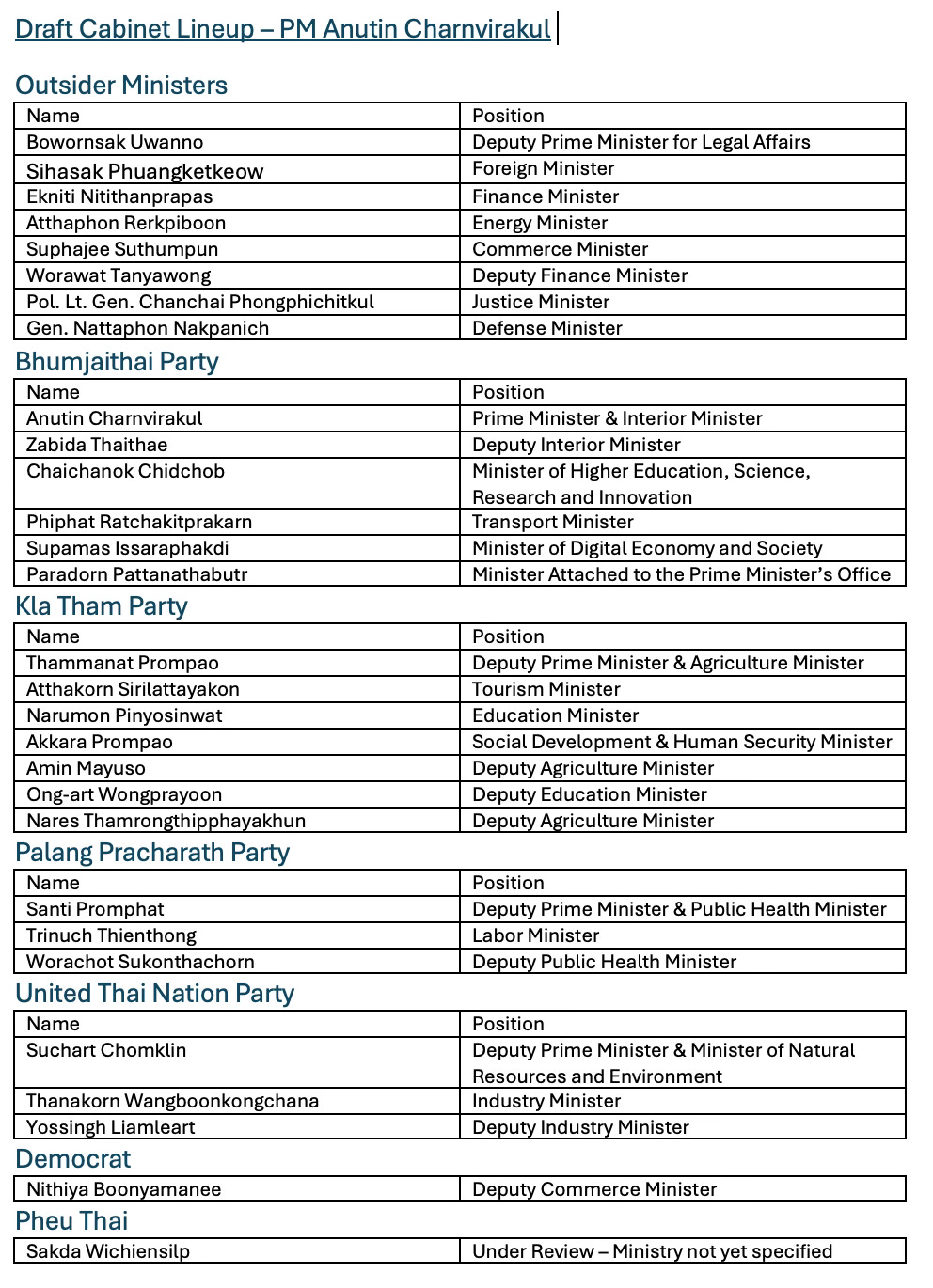Anutin’s Special Cabinet Takes Shape with an Eye on Elections
Anutin Charnvirakul, leader of the Bhumjaithai (BJT) party, comfortably defeated Pheu Thai (PT) candidate Chaikasem Nittisiri last Friday, becoming Thailand’s 32nd prime minister with 311 votes to 152. But he will now be leading a minority government, as the People’s Party (PP), with its 143 seats, will remain in opposition. This was the deal BJT struck with PP, which included holding a constitutional referendum and dissolving the House within four months.
Attention now turns to Anutin’s cabinet, charged with implementing the PP deal and addressing broader challenges such as the border conflict with Cambodia and a stagnant economy. With PP not taking cabinet seats, the allocation for each coalition partner is higher than usual. Bhumjaithai, as the lead party, will take the lion’s share, followed by Kla Tham, Palang Pracharath, United Thai Nation, Democrat, and the breakaway faction from Pheu Thai (see draft cabinet list below).
Anutin’s special cabinet is notably handing key posts to outsiders: Bowornsak Uwanno, a former constitutional drafter, as deputy prime minister for legal affairs; Sihasak Phuangketkeow, former permanent secretary for foreign affairs, as foreign minister; and Suphajee Suthumpun, chief executive of Dusit International, as commerce minister. Using “surplus seats” to bring in seasoned hands compensates for BJT’s shallow bench and bolsters the cabinet’s credibility. The move also avoids the appearance of political greed and offers a subtle nod to conservatives.
Anutin is expected to double hat as prime minister and interior minister, while fellow party members take digital economy and society, transport, higher education, science, research and innovation, and culture. Reclaiming the interior ministry is a symbolic victory over Thaksin and Pheu Thai forces that had ousted him. It also provides a key lever of state power, controlling local patronage networks and influence ahead of the next election. Anutin may also undo Pheu Thai’s recent ministerial reshuffle. Several senior officials previously seen as loyal to him had been moved.
He will also look to keep a lid on the party’s simmering controversies, including the Senate election collusion and Khao Kradong cases. The latter involves shadow BJT leader Newin Chidchob’s sprawling sports complex in his home province of Buriram, where the court has ruled the land belongs to the state railway, yet the interior minister has not revoked the title deeds. Pheu Thai moved to accelerate the revocations after Anutin’s removal, but his return may allow renewed influence.
Similarly, the special investigations department recently sought to expand investigations into the case, but with a new justice minister whose career included significant time in Buriram, it is unclear whether the probe will be pursued vigorously. The ministry, which also oversees the corrections department, now faces the complicated task of managing Thaksin’s incarceration following today’s guilty verdict.
The cabinet list’s finalization has reportedly been delayed by a tussle over the defense portfolio, with Kla Tham leader Thamanat Prompow vying for the post and Palang Pracharath’s Prawit Wongsuwon backing his protégé, Gen. Nat Intharacharoen.
A last-minute twist may see caretaker deputy defence minister Gen. Nattaphon Nakpanich retain his role under a “special quota”; he had previously been counted under United Thai Nation’s. Once the draft list is settled, the cabinet secretary will conduct background and qualification checks, expected to take 7–10 days, before submission to the king for approval.
Anutin’s cabinet is likely to last only four months, barring a breakdown of his deal with PP. He is expected to stick to the agreement to project trust and credibility, which could boost his vote share in the next election. He might even consider an early dissolution to strengthen his campaign, though that would be ambitious.
With such a short term and a minority in the House, major legislation will be difficult. Anutin will therefore focus on extracting gains from existing budgets through recycling or rebranding projects, while using state machinery to maintain his political advantage.
Taken together, these moves underscore the cabinet’s broader aim of securing allies and stability as BJT prepares for an election aimed at drawing seats away from Pheu Thai and capitalizing on recent conservative momentum.

